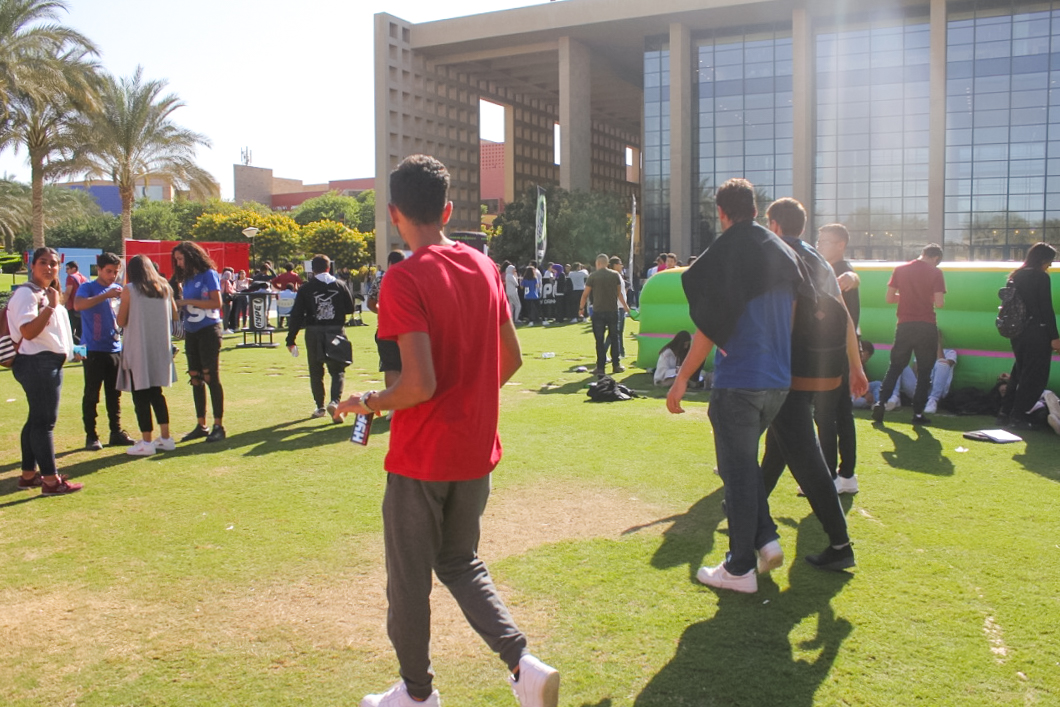By: Bassel Hanna
@basselawsamw
Following the first week of online classes, students and faculty had mixed feedback on how well e-learning could substitute for the classroom experience and the impact on overall quality of education.
Some students said they were concerned about workload and how the entire approach would impact their performance while the AUC community continued with social distancing as a precaution against the COVID-19 outbreak.
“A lot of students have complained that the shift to online instruction has had a detrimental effect on the quality of education received,” said Adham Sherif, a Construction Engineering senior and Community Integration Associate Chairperson in the SU.
Some students have been complaining of a multiplying number of assignments and readings in the wake of online courses.
“My Marketing Research professor sends us prerecorded one-hour lectures on Panopto, but also expects us to be on Zoom during class time. This means that the time needed for the course basically doubles, which is very difficult for us as students especially in highly stressful times like now,” said Freddy George, a Business Administration junior.
Another Business junior, Fady Takla, says AUC tuition should translate into the highest quality of education.
“Even if this is a one-time crisis, there has been no regulation, and professors seem to do whatever they see easiest,” he said.
It seems that the workload is a major concern while some said they enjoyed the flexibility learning from home provides.
“I feel that online classes give us as students great flexibility but it slows down the amount of information you can absorb and a lot of students face a lot of difficulty with connectivity issues,” said Maged Attalla, an Integrated Marketing Communications senior.
But for many, the transition to online instruction can be successful.
“It seems to be working [online instruction]. Most feedback that I am hearing from faculty and students is positive. In my class, students engaged and participated in both our synchronous and asynchronous activities,” said Matthew Hendershot, instructor and associate dean at the Rhetoric and Composition department.
Hendershot is holding on to hope that the semester will be completed successfully.
The Student Union has also been making major strides to understand student reaction to this shift to online learning and how it’s affecting them, either positively or negatively.
“We collected a lot of data from the students from the SU Online Learning Concerns Form, currently we have 483 responses which is a really good number given that this form was only released recently,” said Menna Hassan, the Academic Associate Chairperson.
She said that the students are trying their best to get accustomed to the new medium of teaching while they are “apprehensive” about how their grades will be affected by this.
One of the main student concerns, according to Hassan, is whether the major examinations, such as midterms and finals, will be crammed into one week of physical attendance or should students expect one comprehensive online final that accounts for a hundred percent of the grade.
“The SU is there for the students if they need any help when it comes to academics or tuition, if they have any concerns over any violations, they are heavily encouraged to fill in the form and we will get back to them if there is a case and general concerns will be noted,” said Hassan.
The SU also filed an extensive petition with AUC’s Senior Leadership urging them to give students the option to be graded either in a pass or fail scheme or letter grade scheme according to individual preference.
Online learning can be as rigorous as in-person learning, AUC graduate Meryt Tawfilis, Behavioral Therapist and MA student at Arizona State University, said.
Tawfilis studied online for three years and afterwards enrolled in an online post-graduate course and then started her Masters at Arizona University online as well.
“The whole trick to online learning is how to space out material to be able to cover it in a timely manner,” Tawfilis said.
One of the main advantages to online learning, according to Andrew Dempsey, instructor at the Rhetoric and Composition department, is the personalization of the learning experience.
“We often focus more on ‘online learning’ than online teaching, because it puts the focus on the learner, whereas the teacher is more of a facilitator for the learner’s educational experience,” Dempsey said.
Delivering Arabic online courses for non-native speakers for four years, Dempsey said that further advantages include getting to sleep in, flexibility in how students approach and do assignments, as well as flexibility on the professors’ part with deadlines.
As for the disadvantages, he cited the difficulty of building friendships within the classroom due to the lack of interpersonality as well as the lack of a structured experience.
Dempsey, who was assigned to one of the support committees to foster e-learning at AUC, said that although teaching in-class is easier for him, teaching online for four years has given him a global reach having had 400 students from all over the world.
“An online course must have clear learning objectives, a clear set of content and assignments, and a clear schedule. Expectations need to be laid out in advance and lines of communication [should be] laid out so that the learner can communicate with the teacher easily,” Dempsey said.
In the meantime, students are saying they’re adapting to the new academic realities.
“Of course I enjoy taking my lectures from the comfort of my own bed, but I feel like professors are using the opportunity to give more assignments and deadlines. I can’t keep up with the amount of work we have,” said Zeina Amin, an Integrated Marketing Communications junior.
